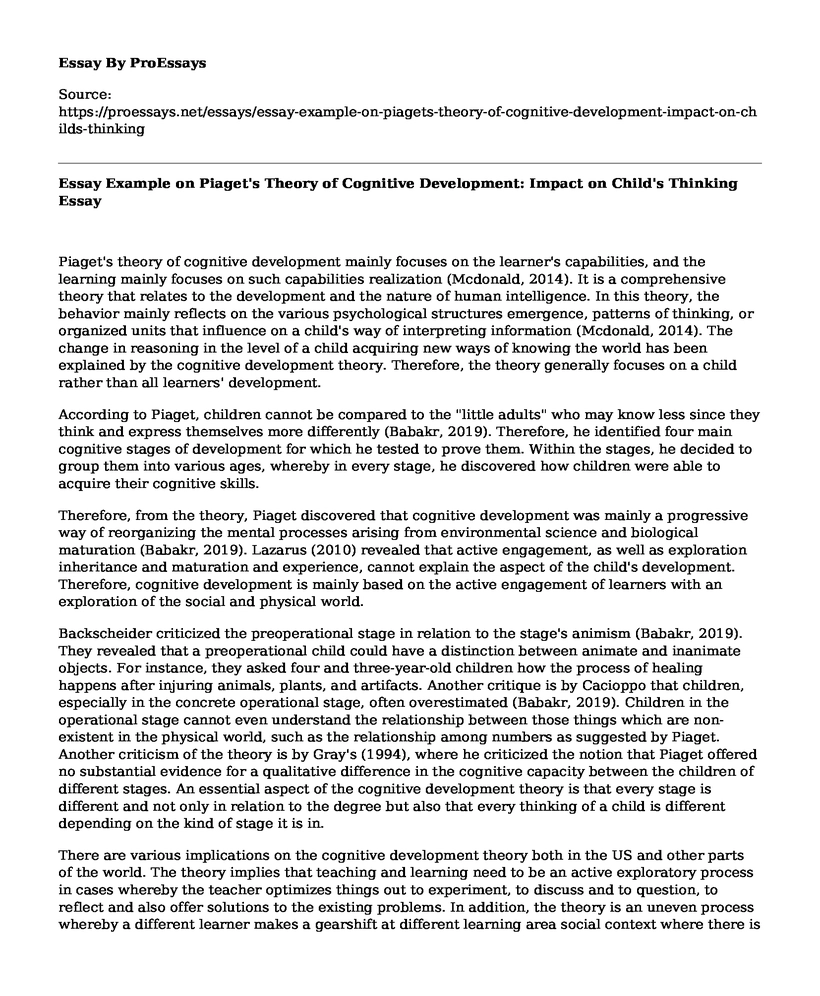Piaget's theory of cognitive development mainly focuses on the learner's capabilities, and the learning mainly focuses on such capabilities realization (Mcdonald, 2014). It is a comprehensive theory that relates to the development and the nature of human intelligence. In this theory, the behavior mainly reflects on the various psychological structures emergence, patterns of thinking, or organized units that influence on a child's way of interpreting information (Mcdonald, 2014). The change in reasoning in the level of a child acquiring new ways of knowing the world has been explained by the cognitive development theory. Therefore, the theory generally focuses on a child rather than all learners' development.
According to Piaget, children cannot be compared to the "little adults" who may know less since they think and express themselves more differently (Babakr, 2019). Therefore, he identified four main cognitive stages of development for which he tested to prove them. Within the stages, he decided to group them into various ages, whereby in every stage, he discovered how children were able to acquire their cognitive skills.
Therefore, from the theory, Piaget discovered that cognitive development was mainly a progressive way of reorganizing the mental processes arising from environmental science and biological maturation (Babakr, 2019). Lazarus (2010) revealed that active engagement, as well as exploration inheritance and maturation and experience, cannot explain the aspect of the child's development. Therefore, cognitive development is mainly based on the active engagement of learners with an exploration of the social and physical world.
Backscheider criticized the preoperational stage in relation to the stage's animism (Babakr, 2019). They revealed that a preoperational child could have a distinction between animate and inanimate objects. For instance, they asked four and three-year-old children how the process of healing happens after injuring animals, plants, and artifacts. Another critique is by Cacioppo that children, especially in the concrete operational stage, often overestimated (Babakr, 2019). Children in the operational stage cannot even understand the relationship between those things which are non-existent in the physical world, such as the relationship among numbers as suggested by Piaget. Another criticism of the theory is by Gray's (1994), where he criticized the notion that Piaget offered no substantial evidence for a qualitative difference in the cognitive capacity between the children of different stages. An essential aspect of the cognitive development theory is that every stage is different and not only in relation to the degree but also that every thinking of a child is different depending on the kind of stage it is in.
There are various implications on the cognitive development theory both in the US and other parts of the world. The theory implies that teaching and learning need to be an active exploratory process in cases whereby the teacher optimizes things out to experiment, to discuss and to question, to reflect and also offer solutions to the existing problems. In addition, the theory is an uneven process whereby a different learner makes a gearshift at different learning area social context where there is a child's development, and also, the desire of that contexts influence the progression of the learners. Therefore, the educational level of the theory is the adaptation of the learner's level of development. It is important to note that the instructional content needs to be consistent with the learners' development level.
Conclusion
In conclusion, it is always possible to incorporate the theory of cognitive development in the classroom. The theory takes a cognitive point of view and reveals that learners in their knowledge are not passive. The contributions of Piaget, especially in relation to the process of education among children and transferring cognition into psychology and this have contributed a lot in the science of the development of a child.
References
Babakr, Z. H., Mohamedamin, P., & Kakamad, K. (2019). Piaget's Cognitive Developmental Theory: Critical Review. Education Quarterly Reviews, 2(3). https://www.researchgate.net/publication/335219854_Piaget's_Cognitive_Developmental_Theory_Critical_Review
Lazarus, S., 2010. Educational Psychology: In social context.4th edition. Cape Town. Oxford University Press.
Mcdonald, Z., Gachago, D., Clowes, L., Condy, J., Livingston, C., Ivala, E., ... & Moodley, T. (2014). The Piaget's theory of cognitive development: An educational implications. Educational Psychology, 1(1), 9. https://www.researchgate.net/institution/Cape_Peninsula_University_of_Technology/department/Faculty_of_Education_and_Social_Sciences/publications
Cite this page
Essay Example on Piaget's Theory of Cognitive Development: Impact on Child's Thinking. (2023, May 23). Retrieved from https://proessays.net/essays/essay-example-on-piagets-theory-of-cognitive-development-impact-on-childs-thinking
If you are the original author of this essay and no longer wish to have it published on the ProEssays website, please click below to request its removal:
- Essay on Results of the Study on Autistic Children
- Essay Sample on Individual Creative Thinking Profile
- Social Ecological Model and Factors That Contribute to Poor Mental Health Essay
- Anxiety & Family: Bess' Story - Case Study
- Intersex Individuals Through History: An Exploration - Essay Sample
- Multicultural Counseling: Essential for Effective Counseling - Essay Sample
- Self-Esteem: Brain's Vital Role in Interpersonal Interactions - Free Paper







